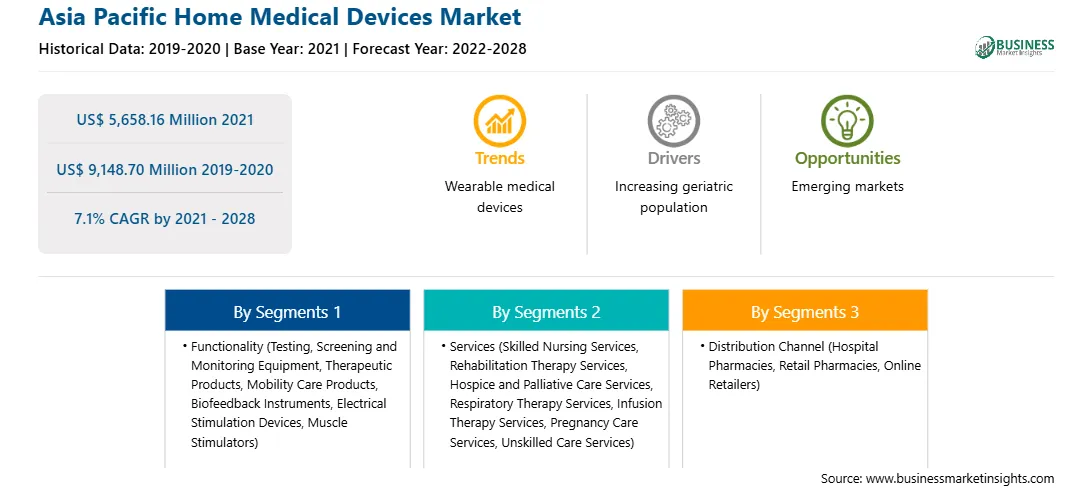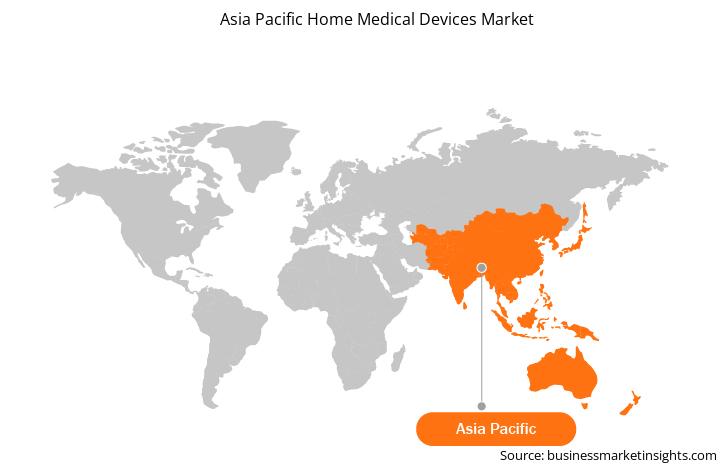Asia Pacific includes countries such as China, Japan, India, Australia, South Korea and Rest of Asia Pacific. This region accounted for over second fastest growing region of the global home medical devices market in 2020 owing to the increasing medical device production in countries such as India, Japan, and South Korea. Whereas the up-gradation in the medical device guidelines and government support for the increasing production in Australia and China are expected to drive market growth significantly during the forecast period. The medical device industry in China has grown at a faster pace in the past several years. The factors that have enhanced the medical industry in China include continued economic growth, China’s 13th Five-Year Plan that prioritized health and innovation, increased demand for technologically advanced medical devices, significantly rising geriatric population, and growing chronic health conditions among people. In addition, the availability of low-cost and skilled laborers and massive space for production has attracted various market leaders to have their production plants in China. Also growing prevalence of chronic diseases is likely to increase the demand for home medical devices. According to the study by Tulane University published in April 2018, 8.6% of the china’s total adult population that is over 100 million people suffer from chronic lung disease who often requires pulse oximeter. As per Globocan 2018 report, lung cancer is the most common cancer in China. There were 774,323 cases of lung cancer in China in 2018. This is likely to increase the demand for pulse oximeters in china. Furthermore, increasing availability of home medical devices on e-commerce platforms is likely to favor the market growth. For instance, Hema, a supermarket chain under Alibaba, has launched an “adult channel” section on its mobile app, that promises to deliver adult products such as condoms, lube, vibrators among others within half an hour. Such, distribution strategies are likely to boost the growth of the market in China.
Countries in Asia Pacific are facing challenges due to the increasing incidence of COVID-19. As per the data of Worldometer, as of March 22, 2021, China reported a total of 90,049 COVID-19 cases, while in Japan it stood at 446,873 India recorded 11,385,339 cases, and Australia reported 29,126 confirmed cases. Due to the growing demand for necessary medical equipment, shortages are seen across the globe. Hence, India has increased the level of production for COVID-19 protective gears and medical equipment, thereby reducing the dependency on foreign countries. Earlier, personal protective equipment (PPE) was imported from foreign countries, and recently there are 111 indigenous manufacturers of PPE. Moreover, in India, as per the newspaper, it has been reported by e-Commerce that pandemic has provoked a rapid increase in the usage of at-home diagnostic devices such as most demanding ones are pulse oximeters, blood pressure monitors, digital thermometer, and a glucometer due to fear of going to diagnostic centers for medical tests. For instance, Flipkart has witnessed nearly 23 times increase in demand for pulse oximeters and 26 times increase in demand for infrared thermometers.

Strategic insights for the Asia Pacific Home Medical Devices provides data-driven analysis of the industry landscape, including current trends, key players, and regional nuances. These insights offer actionable recommendations, enabling readers to differentiate themselves from competitors by identifying untapped segments or developing unique value propositions. Leveraging data analytics, these insights help industry players anticipate the market shifts, whether investors, manufacturers, or other stakeholders. A future-oriented perspective is essential, helping stakeholders anticipate market shifts and position themselves for long-term success in this dynamic region. Ultimately, effective strategic insights empower readers to make informed decisions that drive profitability and achieve their business objectives within the market.

| Report Attribute | Details |
|---|---|
| Market size in 2021 | US$ 5,658.16 Million |
| Market Size by 2028 | US$ 9,148.70 Million |
| Global CAGR (2021 - 2028) | 7.1% |
| Historical Data | 2019-2020 |
| Forecast period | 2022-2028 |
| Segments Covered |
By Functionality
|
| Regions and Countries Covered | Asia-Pacific
|
| Market leaders and key company profiles |
The geographic scope of the Asia Pacific Home Medical Devices refers to the specific areas in which a business operates and competes. Understanding local distinctions, such as diverse consumer preferences (e.g., demand for specific plug types or battery backup durations), varying economic conditions, and regulatory environments, is crucial for tailoring strategies to specific markets. Businesses can expand their reach by identifying underserved areas or adapting their offerings to meet local demands. A clear market focus allows for more effective resource allocation, targeted marketing campaigns, and better positioning against local competitors, ultimately driving growth in those targeted areas.

The home medical devices market in APAC is expected to grow from US$ 5,658.16 million in 2021 to US$ 9,148.70 million by 2028; it is estimated to grow at a CAGR of 7.1% from 2021 to 2028. Rising market consolidation; Market consolidation is a widely accepted strategy by the market players to sustain their position in the market. The market consolidation strategy has enabled various players to enhance their R&D activities and expand their product portfolio. For instance, in December 2016, Medtronic plc has partnered with Fitbit to integrate health and activity tracking for diabetic patients, physicians, and care teams. The collaboration has introduced, iPro 2 myLog mobile app that has enabled type 2 diabetic patients to see their glucose levels and physical activity data in a single application. In November 2017, Philips India Ltd announced the expansion of its Healthcare@home services. The services are beyond respiratory and critical care, and the company aimed to provide a high-quality and extensive range of health care facilities at home. The company has offered customized services that are supported by technologically advanced medical devices and patient monitoring systems. Philips has developed services for consultations with India’s leading hospitals. The new services were provided across NCR, Mumbai, Hyderabad, and Bengaluru. Also, it has planned to offer its services to 5 more cities by the end of 2017. Moreover, the company has marked its significant position in the Indian market by successfully introducing ICU@home in 4 major cities across India. Philips has brought an evolution to a hospital-like ICU set up at home by making things easier for both the patients and caregivers.
Based on functionality, the home medical device market is segmented into testing, screening and monitoring equipment, therapeutic products, mobility care products, biofeedback instruments, electrical stimulation devices, and muscle stimulators. In 2020, the testing, screening and monitoring equipment segment held the largest share of the market and is also expected to grow at the fastest rate during the coming years. Based on the services home medical device market is segmented into skilled nursing services, rehabilitation therapy services, hospice and palliative care services, respiratory therapy services, infusion therapy services, pregnancy care services, and unskilled care services. In 2020, the skilled nursing services segment held the largest share of the market and is expected to grow at the fastest rate during the coming years. Based on distribution channel, the home medical device market is segmented into hospital pharmacies, retail pharmacies, and online retailers. The hospital pharmacy segment held the largest share of the market in 2020.
A few major primary and secondary sources referred to for preparing this report on the home medical devices market in APAC are company websites, annual reports, financial reports, national government documents, and statistical database, among others. Major companies listed in the report are Abbott, B. Braun Melsungen AG, Baxter International Inc, F. HOFFMANN-LA ROCHE LTD, GE Healthcare, Johnson and Johnson Services, Inc., Koninklijke Philips N.V., Medline Industries, Inc and Medtronic.
The Asia Pacific Home Medical Devices Market is valued at US$ 5,658.16 Million in 2021, it is projected to reach US$ 9,148.70 Million by 2028.
As per our report Asia Pacific Home Medical Devices Market, the market size is valued at US$ 5,658.16 Million in 2021, projecting it to reach US$ 9,148.70 Million by 2028. This translates to a CAGR of approximately 7.1% during the forecast period.
The Asia Pacific Home Medical Devices Market report typically cover these key segments-
The historic period, base year, and forecast period can vary slightly depending on the specific market research report. However, for the Asia Pacific Home Medical Devices Market report:
The Asia Pacific Home Medical Devices Market is populated by several key players, each contributing to its growth and innovation. Some of the major players include:
The Asia Pacific Home Medical Devices Market report is valuable for diverse stakeholders, including:
Essentially, anyone involved in or considering involvement in the Asia Pacific Home Medical Devices Market value chain can benefit from the information contained in a comprehensive market report.